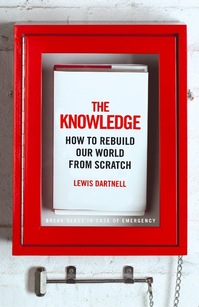Source of book image: http://knowledge.dsruptiv.net/en-gb/wp-content/uploads/2013/12/The-Knowledge-Full-Cover_lowres.jpg
(p. 8) Over the past generation or two we’ve gone from being producers and tinkerers to consumers. As a result, I think we feel a sense of disconnect between our modern existence and the underlying processes that support our lives. Who has any real understanding of where their last meal came from or how the objects in their pockets were dug out of the earth and transformed into useful materials? What would we do if, in some science-fiction scenario, a global catastrophe collapsed civilization and we were members of a small society of survivors?
My research has to do with what factors planets need to support life. Recently, I’ve been wondering what factors are needed to support our modern civilization. What key principles of science and technology would be necessary to rebuild our world from scratch?
. . .
. . . there are the many materials society requires: How do you transform base substances like clay and iron into brick or concrete or steel, and then shape that material into a useful tool? To learn a small piece of this, I spent a day in a traditional, 18th-century iron forge, learning the essentials of the craft of the blacksmith. Sweating over an open coke-fired hearth, I managed to beat a lump of steel into a knife. Once shaped, I got it cherry-red hot and then quenched it with a satisfying squeal into a water trough, before reheating the blade slightly to temper it for extra toughness.
. . .
. . . , it needn’t take a catastrophic collapse of civilization to make you appreciate the importance of understanding the basics of how devices around you work. Localized disasters can disrupt normal services, making a reasonable reserve of clean water, canned food and backup technologies like kerosene lamps a prudent precaution. And becoming a little more self-reliant is immensely rewarding in its own right. Thought experiments like these can help us to explore how our modern world actually came to be, and to appreciate all that we take for granted.
For the full commentary, see:
LEWIS DARTNELL. “OPINION; Civilization’s Starter Kit.” The New York Times, SundayReview Section (Sun., MARCH 30, 2014): 8.
(Note: ellipses added.)
(Note: the online version of the commentary has the date MARCH 29, 2014.)
Dartnell’s commentary, quoted above, has been elaborated in his book:
Dartnell, Lewis. The Knowledge: How to Rebuild Our World from Scratch. New York: Penguin Press, 2014.

